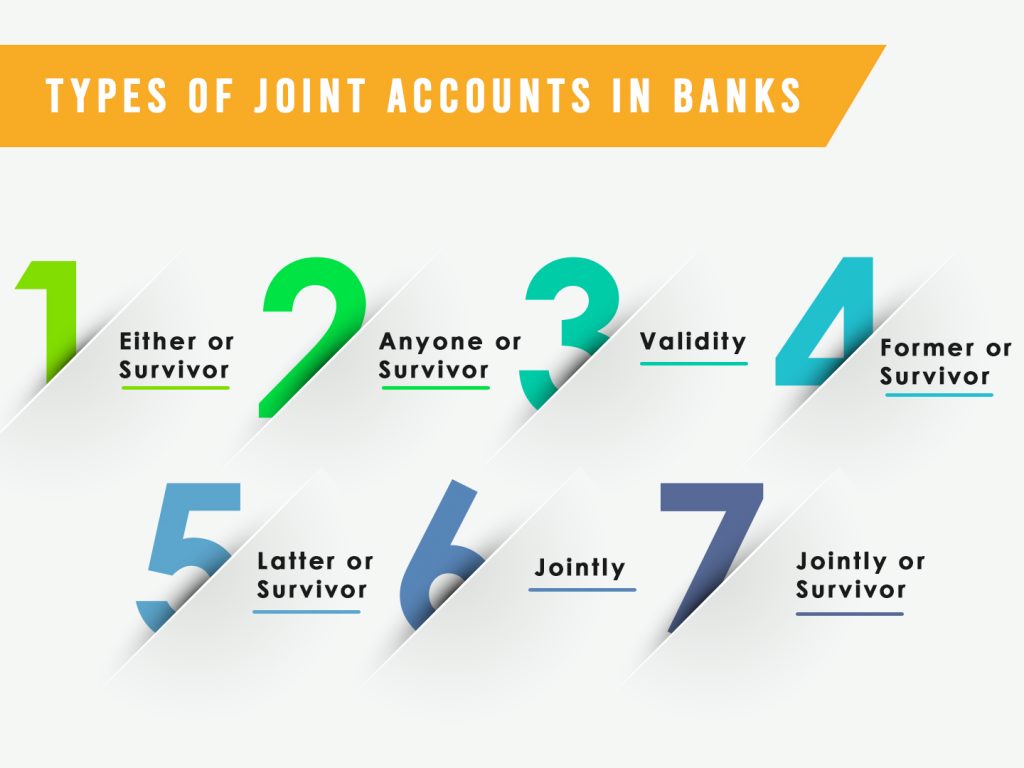Search
7 different types of Joint Accounts in Banks?
March 04, 2024

An individual can open a bank account by being a single account holder or as a joint account holder with another person.
However, there are many types of joint accounts, which are:
1. Either or Survivor
The majority of joint accounts are “Either or Survivor” nature. This is because these can be accessed and managed by either of the account holders, i.e. the primary account holder as well as the secondary account holder.
If one of the account holders passes away, then the account balance can be paid to the “survivor” account holder.
2. Anyone or Survivor
This is similar to the joint account explained above. However, in this case, more than two people can operate the account.
Thus, just like the “either-or survivor” a joint account is a good option for a couple, the “anyone or survivor” is a good option for a family as a whole.
This is because this type of joint account can be managed by all the family members.
If an account holder dies, the remaining or “survivor” account holders can then operate the account and become the owner of the balance amount.
3. Validity
An individual health insurance policy continues to be valid as long as the customer pays the premium on time.
However, a group insurance policy ceases to be valid when an employee changes their company or resigns for some other reason.
4. Former or Survivor
In this, only the primary account holder can operate the account.
The secondary account holder gets access to the account when the primary account holder passes away.
5. Latter or Survivor
This one is the opposite of the previous one. So, in this case, the secondary account holder has access to the account.
The primary account holder can get access to it only if and when the second account holder passes away.
6. Jointly
In this, all the transactions need to be signed and mandated by all the account holders.
If any of the account holders dies then the account can not be further operated. The balance of the proceeds shall be payable to the survivor
7. Jointly Or Survivor
This type of account is similar to the one above. Here, the difference is that the survivor can operate the account.
Alternatively, the proceeds of the account will be transferred to his/her account.
Important things to note:
As per the RBI guidelines, if one of the account holders in a joint account passes away, then the survivor will hold the funds only as a trustee of the legal heirs unless they themselves are the legal heir.
However, when the legal heir wants to claim the funds in the account, the bank shall make the payment to the survivor account holder.
If you are keenly interested in learning more about banking topics,
You should enroll in a banking and finance course from the Best Banking Course Institute.
To help you with this, we suggest you take admission to TSCFM, which offers you a Professional Banking Course with Placement. It is the Best Institute for Diploma in Banking and Finance.
Related Post:
Important Links:
- 4-IN-1 Professional Diploma in Banking, Financial Services & Insurance (PDBFSI): https://ask.careers/courses/4-in-1-professional-diploma-in-banking-financial-services-insurance-pdbfsi/
- Mumbai: https://ask.careers/cities/mumbai/
- TSCFM: https://ask.careers/institutes/tscfm/



